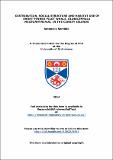Distribution, social structure and habitat use of short-finned pilot whale, Globicephala macrorhynchus, in the Canary Islands
Abstract
The Canary Archipelago is considered one of the planet’s biodiversity hotspots and the
short-finned pilot whale is a key species in need of conservation measures. To address a
lack of knowledge, almost 2,000 day-surveys were conducted (1999-2012) resulting in
1,094 short-finned pilot whale sightings. The species was recorded year-round and
distributed non-uniformly around the archipelago, with greater densities concentrated in
patchy areas mainly on the leeward side of the main islands. A total of 1,320 well-marked individuals were identified, which exhibited a large degree of variability in site
fidelity (from core residents to transients). Evidence of an island-associated sub-population and a transient one was found. Longitudinal data were used to infer
population structure and estimate abundance, while a spatial modelling approach was
used to study spatio-temporal patterns in habitat use, distribution and abundance.
Spatial modelling revealed habitat preferences in areas between depths of 1000m and
1500m, and higher densities in the south-west of Tenerife and La Gomera (117 short-finned pilot whales recaptured within the two islands). Abundance of 1,980 individuals
(CV = 0.33, 95% CI=1,442 – 2,324) was estimated for the entire archipelago, with higher
density predicted during the summer months. Mark-recapture analysis estimated 636
resident individuals (CV = 0.028, 95% CI=602 - 671) in the southwest waters of Tenerife
between 2007 and 2009.
The social and temporal analyses of the behavioural relationships between pairs of
individuals revealed a well-differentiated society with long-lasting and non-random social
structure built of constant companions. A hierarchical social system is proposed
composed of a population encompassing several clans of pilot whales, each one
containing several pods. Nine long-term units were identified with a high degree of
association (0.62 - 0.83).
This study, the first to provide combined results on distribution, habitat use, and social
structure of the species, provides essential information towards the development of
recommendations for much needed conservation measures.
Type
Thesis, PhD Doctor of Philosophy
Collections
Items in the St Andrews Research Repository are protected by copyright, with all rights reserved, unless otherwise indicated.

